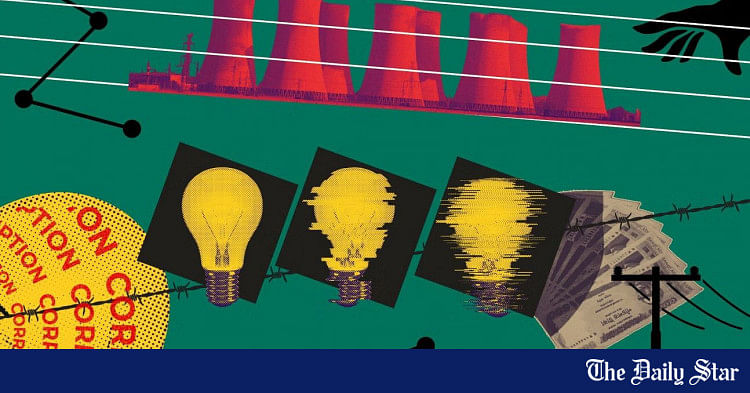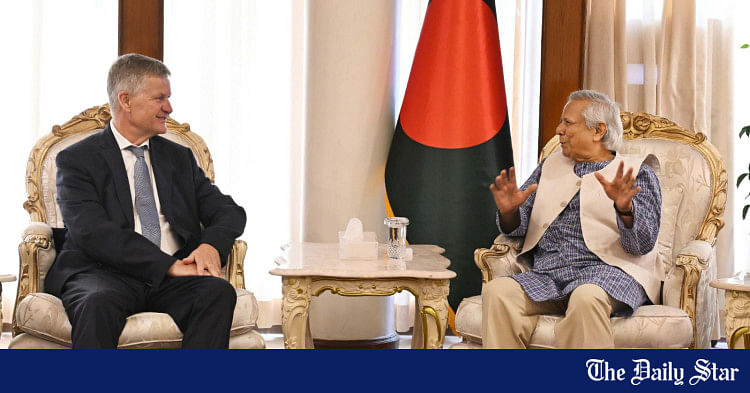Saif
Senior Member
- Messages
- 17,461
- Likes
- 8,403
- Nation

- Residence

- Axis Group


Energy key to economic efficiency, says CA’s Press Secretary
CA’s Press Secretary Shafiqul Alam said on Wednesday energy is the key to economic efficiency and no economy can function optimally without fixing the sector. Speaking at the ‘Development Journalist Forum of Bangladesh (DJFB) Talk’ at the NEC Conference Room in Sher-e-Bangla Naga
Energy key to economic efficiency, says CA’s Press Secretary
FE Online Desk
Published :
Feb 26, 2025 18:26
Updated :
Feb 26, 2025 18:26

CA’s Press Secretary Shafiqul Alam said on Wednesday energy is the key to economic efficiency and no economy can function optimally without fixing the sector.
Speaking at the ‘Development Journalist Forum of Bangladesh (DJFB) Talk’ at the NEC Conference Room in Sher-e-Bangla Nagar, he criticised the previous Awami League government for mishandling the energy sector, which he claimed led to large-scale corruption and mismanagement, UNB reports.
“The entire system, like the capacity charge, was an arrangement for organized looting,” Alam alleged.
Citing findings from the White Paper, the Press Secretary stated that around $234 billion was laundered abroad during the previous regime. “Had this money remained in the country, it could have been reinvested to create jobs and boost economic growth,” he said.
Shafiqul Alam highlighted the current government’s focus on restoring macroeconomic stability. “We are seeing positive results as inflation has been declining for two consecutive months. We expect it to fall to around 7 percent by June, bringing much-needed relief to the people.”
He said that commodity prices are coming down and a stable inflation rate is helping maintain a steady exchange rate, positively impacting the development budget.
Blaming the previous government for destabilising the economy, he criticised the 9 per cent cap on both deposit and lending rates, and described the banking sector’s condition under the former regime as “daylight robbery while everyone was asleep.”
Despite these challenges, Alam expressed optimism about the interim government’s reforms, including improvements in the labor sector, enhanced efficiency at Chattogram Port and efforts to attract more foreign investment.
“We are working to restore discipline in the energy sector, pursuing policies like ‘no electricity, no payment’ and increasing the focus on solar power and regional energy cooperation through the Bangladesh-India-Bhutan-Nepal (BIBN) SA Electricity Grid,” he explained.
The government is also prioritising faster gas exploration, digitalising administrative processes to curb corruption, and attracting more foreign direct investment (FDI).
Alam stressed the importance of FDI in tackling unemployment and said the current administration had addressed issues that previously hindered foreign companies from repatriating profits. “These initiatives send the right signal to foreign investors that Bangladesh is committed to efficiency and tackling corruption,” he said.
He expressed confidence that Bangladesh would become a top performer in the global economy with ongoing reforms in the labor sector, improved port efficiency and enhanced energy management.
On law and order, Alam said the government had already taken nine measures to improve the situation and expected significant progress soon.
He also assured that the central bank had been working to restore discipline in the banking sector and protect depositors in troubled banks.
Addressing agriculture, Alam said the interim government was taking farmer-friendly initiatives to ensure food self-sufficiency.
FE Online Desk
Published :
Feb 26, 2025 18:26
Updated :
Feb 26, 2025 18:26
CA’s Press Secretary Shafiqul Alam said on Wednesday energy is the key to economic efficiency and no economy can function optimally without fixing the sector.
Speaking at the ‘Development Journalist Forum of Bangladesh (DJFB) Talk’ at the NEC Conference Room in Sher-e-Bangla Nagar, he criticised the previous Awami League government for mishandling the energy sector, which he claimed led to large-scale corruption and mismanagement, UNB reports.
“The entire system, like the capacity charge, was an arrangement for organized looting,” Alam alleged.
Citing findings from the White Paper, the Press Secretary stated that around $234 billion was laundered abroad during the previous regime. “Had this money remained in the country, it could have been reinvested to create jobs and boost economic growth,” he said.
Shafiqul Alam highlighted the current government’s focus on restoring macroeconomic stability. “We are seeing positive results as inflation has been declining for two consecutive months. We expect it to fall to around 7 percent by June, bringing much-needed relief to the people.”
He said that commodity prices are coming down and a stable inflation rate is helping maintain a steady exchange rate, positively impacting the development budget.
Blaming the previous government for destabilising the economy, he criticised the 9 per cent cap on both deposit and lending rates, and described the banking sector’s condition under the former regime as “daylight robbery while everyone was asleep.”
Despite these challenges, Alam expressed optimism about the interim government’s reforms, including improvements in the labor sector, enhanced efficiency at Chattogram Port and efforts to attract more foreign investment.
“We are working to restore discipline in the energy sector, pursuing policies like ‘no electricity, no payment’ and increasing the focus on solar power and regional energy cooperation through the Bangladesh-India-Bhutan-Nepal (BIBN) SA Electricity Grid,” he explained.
The government is also prioritising faster gas exploration, digitalising administrative processes to curb corruption, and attracting more foreign direct investment (FDI).
Alam stressed the importance of FDI in tackling unemployment and said the current administration had addressed issues that previously hindered foreign companies from repatriating profits. “These initiatives send the right signal to foreign investors that Bangladesh is committed to efficiency and tackling corruption,” he said.
He expressed confidence that Bangladesh would become a top performer in the global economy with ongoing reforms in the labor sector, improved port efficiency and enhanced energy management.
On law and order, Alam said the government had already taken nine measures to improve the situation and expected significant progress soon.
He also assured that the central bank had been working to restore discipline in the banking sector and protect depositors in troubled banks.
Addressing agriculture, Alam said the interim government was taking farmer-friendly initiatives to ensure food self-sufficiency.








